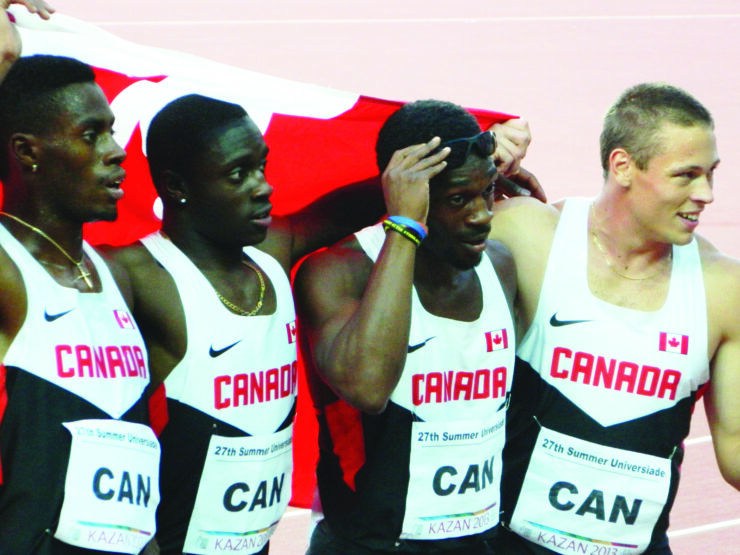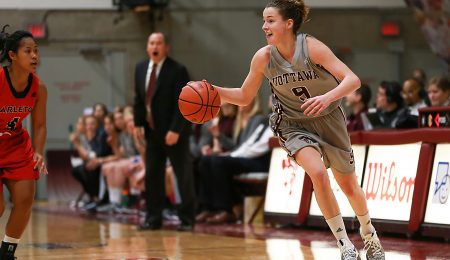Women’s rugby players bring home bronze medal from FISU World Games
Maclaine Chadwick | Fulcrum Contributor
SECOND ONLY TO the Olympics in number of participants, the International University Sport Federation (FISU) World Games brings together student-athletes from around the world every two years to compete for their country. The 27th Summer Universiade event was held in Kazan, Russia from July 5–17 and had 10 University of Ottawa Gee-Gees in attendance—some of whom came home with medals in hand.
Natasha Watcham-Roy and Sarah Meng of the Gee-Gees women’s rugby team were two of the athletes to earn a spot on the podium. Representing Canada alongside other university rugby players from across the country, Meng and Watcham-Roy helped their team earn the bronze medal in a blowout 36-0 game against Great Britain.
No stranger to the international stage, Watcham-Roy had participated in the 2010 World University Championships in Portugal—an experience that definitely gave her an edge, proven when she scored the first try of the bronze medal game after less than two minutes of play.
The athletes spoke to the Sports Services in interviews prior to the event.
“I’m hoping this will lead to something bigger,” said Watcham-Roy, who aspires to continue representing her country by playing for Rugby Canada.
Meng, the former Gee-Gees captain, was chosen as an alternate on the team. When one player had to drop out of the roster due to an injury, she was the first person called by the coaches.
“I had been training as if I was going the whole time,” said Meng prior to the games, “so when that phone call came, I [was] ready to go.”
Like her teammate, Meng also aspires to continue competing for her country.
“I’ve spent five years playing at the University of Ottawa. I’ve grown as a player, I’m a more dynamic player,” she said. “I see FISU as being the next step in my goal [to] wear the Canadian flag.”
Gee-Gees track and field runner Michael Robertson earned a silver medal in the men’s 4×400-metre relay alongside compatriots Benjamin Ayesu-Attah, Brendon Rodney, and Tyler Harper, finishing in a time of 03:05.26, less than two seconds behind the gold-medal winners from Russia. The relay team’s medal was the 10th earned by Canada at the games and the best result earned by a Gee-Gee in the 2013 event.
Gees’ decathlete Patrick Arbour and sprinter Segun Makinde also joined their track and field teammate at the Universiade games. Arbour finished eighth overall in the decathlon with a total score of 7,240—894 points behind Belgium’s gold-medal winner. Makinde came even closer to a medal, missing the podium by .28 of a second and coming in fourth place with a time of 20 minutes 68 seconds in the men’s 200-metre final.
Two members of the 2012 OUA Championship soccer team, Julia Francki and Pilar Khoury, also traveled to Kazan to play for their country. Although the squad was eliminated by Russia in the preliminaries, they said the opportunity to play internationally was what made the experience worth it.
“This is a big milestone for me,” said Khoury. “Growing up, I was never on the top teams, I was never that big girl, that captain, or that best player, so having the opportunity to go play with players who’ve been there is amazing.”
“I think this experience of playing internationally will help me in the upcoming season,” said Francki. “I’ll be coming into the season very fit.”
Three members of the U of O’s fencing team—Marc-Andre Leblanc, John Wright, and Kerr Hutchinson—were invited to Canada’s Universiade men’s épée team because of their high rankings and performances at events like the World Cup and Pan-American games. Leblanc was the only member with previous Universiade experience, having participated in the 2005 and 2009 events.
Unfortunately for the fencers, the international opponents in Kazan defeated each member of the Gee-Gees in the first round of both individual and team épée.
Like the Olympics, FISU hosts competitions every two years, alternating between summer and winter sporting events. Unlike the Olympics, however, the FISU Universiades are the only multiple-sport events that connect international competition with athletics and academics. The games are open to athletes between the ages of 17 and 28 who are registered in full-time studies or have graduated within the year leading up to the event.
Canadian student-athletes earned 10 medals overall at the 27th Summer Universiade.
For more information on how Team Canada fared at the FISU Summer Universiade, visit www.fisu.net.





